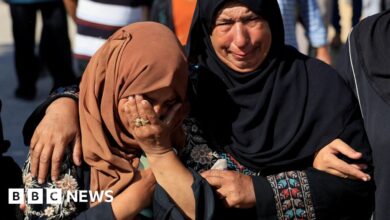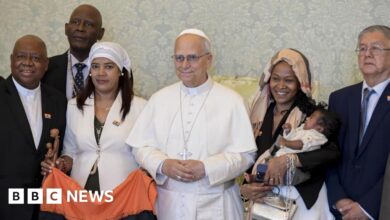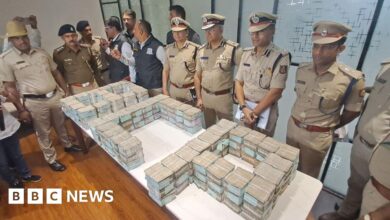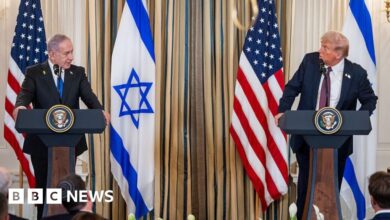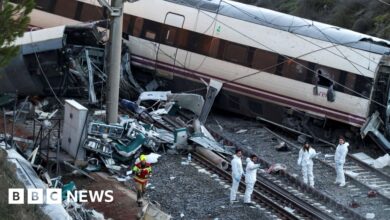Will Romania vote take country away from European mainstream?
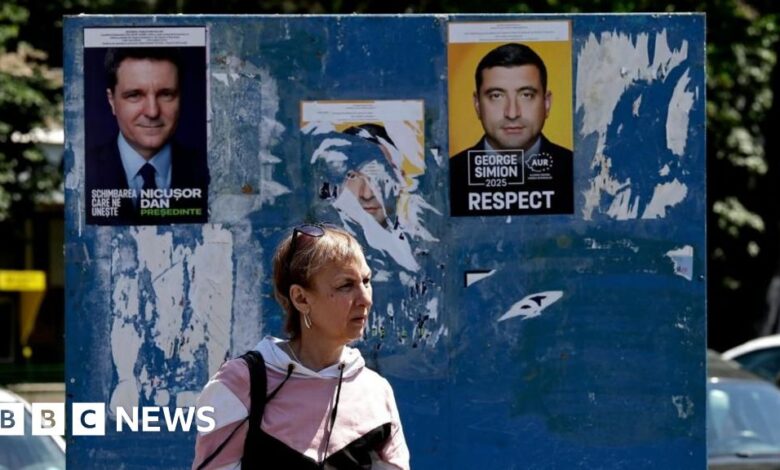
Eastern Europe correspondent
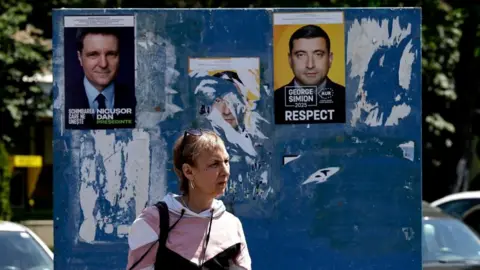 EPA-EFE/Shutterstock
EPA-EFE/ShutterstockWhen Romania’s presidential election was annulled late last year after claims of Russian interference, a far-right conspiracy theorist was blocked from the top job.
Many Romanians were deeply relieved; many others were angry their votes had been stolen.
But six months later, with the country back at the ballot box, another hard-right Euro-sceptic is in the running for president.
George Simion won the first round of the new elections on 4 May by a large margin. Now the former football casual turned nationalist politician is facing off against Nicusor Dan, the liberal mayor of Bucharest.
It’s a vote that could see Romania, a member of both Nato and the European Union (EU), take a sharp turn away from the European mainstream.
Both candidates cast their votes on Sunday morning, with Simion saying he had voted for the future “that should be decided only by Romanians, for Romanians and for Romania”.
While Dan told reporters he was voting for “collaboration with our European partners and not for an isolation of Romania”.
The polls have been too close to call.
Teleorman county is one of Romania’s poorest areas and has been solidly social-democrat territory for many years. But earlier this month, 57% of voters here chose Simion for president in the first round of voting.
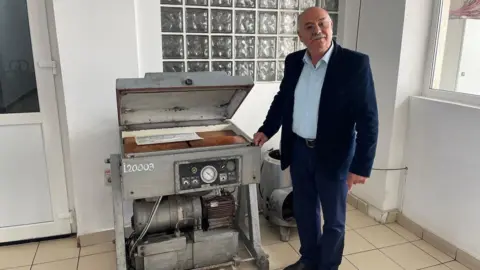
A couple of hours’ drive south-west from Bucharest, entry to the region is announced in blue letters on a rusty metal arch over the main road.
The streets are lined with wild poppies, not campaign posters for the candidates. There’s no obvious sign of the elections.
But social media feeds on people’s phones are full of political content.
The latest clip to go viral features a folk fantasy world of embroidered tops, prayers and bears and has the slogan “I choose Romania”.
“It was an anti-system, anti-mainstream vote,” is how Felicia Alexandru of Aperio Intelligence explains the nationwide surge of support for the far-right candidate in the first round.
After more than three decades of the same parties dominating politics, frustration with corruption and poor performance has been building.
“People are so unhappy with what happened in high level politics, this is a vote against that,” Felicia says.
The protest vote is not confined to the poorest or most disaffected.
The Comalat dairy firm is unrecognisable from the business Petre Filip launched 25 years ago.
Back then, he would set out at 05:00 every day in his Dacia to drive round farms buying up milk. Then, each evening, he hand-delivered the cheese and yoghurt produced by his three workers to clients.
His old packaging machine now stands in the lobby as a reminder of the early days. But Petre has since been granted €1.5m (£1.3m; $1.7m) in EU funding to modernise and expand his business. It’s money he never has to pay back.
“That was a really, really good thing for us,” the businessman enthuses, showing off a production line of glistening metal machines in several rooms.
He employs more than 50 staff.
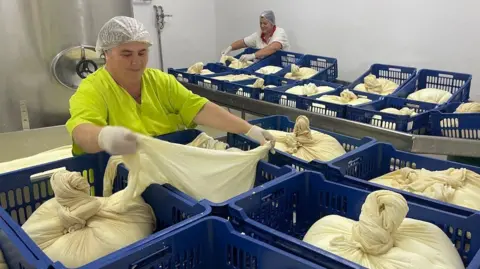
“I like George Simion,” staff member Mihaela announces with a smile, while squeezing liquid from big clumps of curd cheese.
She shrugs when I mention the fear in Brussels that he would make EU-Romania relations very turbulent.
“He’s on the side of Romanians. He’s for the people. To create jobs and better lives,” Mihaela replies.
Simion talks a lot about “making Romania great again”, echoing the MAGA politicians in the US he so admires. He has the same isolationist approach, too: Romania first, in everything.
When pushed, he has called Russian President Vladimir Putin a war criminal for his invasion of Ukraine.
But like Donald Trump, he has also pledged to end military aid to Kyiv and he’s left the future of Ukraine’s vital grain exports via Romania unclear.
Simion has been banned from Ukraine and Moldova for calling for territory there to be part of Romania.
In his latest outbursts this week, he called his election opponent an “autistic, poor guy”.
He also accused French President Emmanuel Macron of having “dictatorial tendencies”.
Mr Filip says Simion is “far too impulsive” to be president, driven “by hormones not his brain”.
But he is so disillusioned by the whole scene he’s inclined not to vote at all.
Just up the road in Roșiori de Vede, they are discussing the elections too – and fretting.

Roxana runs a factory making work uniforms, including for the military in another EU country.
Her clients have been calling wondering whether Romania is about to vote for a “pro-Russian” president.
“They want to know whether their orders are safe!” she laughs.
Roxana herself plans to vote for the man people here refer to by his first name, Nicusor, because she likes how he’s managed Bucharest as mayor.
She’s also deeply disturbed by what she calls Simion’s “hooligan” behaviour.
“It’s such a bad image for Romania in Europe. I am ashamed,” Roxana says, recalling the candidate’s insults about Macron this week.
In another recent incident, Simion threatened to sexually assault a female MP, calling her a pig.
“Compare that with a person who won the International Mathematics Olympiad,” Roxana says, referring to a competition Dan won in the 1980s. He went on to get a doctorate from the Sorbonne.
Ahead of the second-round vote, Roxana and her friend Andrea have been involved in a grassroots initiative to persuade voters to back Dan.
“I’ve tried to say why Simion’s plan is unfeasible but I don’t think I’ve been super successful,” Andrea admits, and says she’s “very worried”.
“I see what people are saying online and they really believe in Simion and think he’s going to shake everything up and take down the system.
“They think it’s all bad, but it’s not.”
Her own candidate, Dan, is emphatically pro-EU and pro-Nato, and his campaign slogan is “honesty”.
“I don’t promise miracles,” is his modest election pledge. “But I promise I will fight.”
If that fight fails, and Simion wins, he won’t be the only hard-right candidate at the forefront of Romanian politics.
Much of his support comes from those who originally voted for Calin Georgescu, the fringe figure who won the first election in November before it was cancelled on national security grounds.
The two men have often appeared side-by-side since then, and Simion has pledged to make Georgescu prime minister if he’s elected.
It’s unclear how that could work, given that he was accused of benefiting from “massive” and “aggressive” meddling by Moscow.
“If Simion wins then there will be chaos in politics from Monday,” Roxana predicts, including for the economy.
“The question is whether he stays in the shadow of Georgescu, or completely changes perspective,” Felicia agrees.
“Is this a campaign strategy, or what he believes in?”
https://ichef.bbci.co.uk/news/1024/branded_news/d7bc/live/f58a8cd0-337a-11f0-8519-3b5a01ebe413.jpg
2025-05-18 06:48:40


